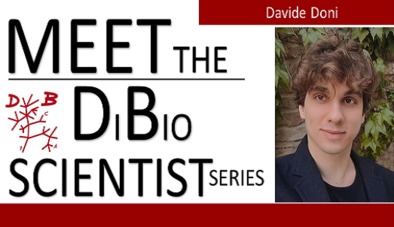
MEET THE DIBIO SCIENTIST SERIES : Davide Doni
Scadenza: 02.11.2022 14:35
Pubblicato il: 01.12.2022 13:00
Davide is a post-doctoral fellow at DiBio
Can you summarize in few words your research?
I am studying the role of the protein frataxin in the pathophysiology of Friedreich’s ataxia, a mitochondrial and cardio-neurodegenerative disease. Frataxin has been claimed to participate in the biogenesis of Fe-S clusters, key prosthetic groups essential for several fundamental molecular processes including electron transport, enzymatic catalysis and metabolic regulation; however, its precise function is still unknown. In this context, my work aims to elucidate frataxin’s role through a multidisciplinary approach, ranging from in vitro biochemistry to advanced spectroscopic analysis, to mitochondrial physiology and cell imaging.
What is the most rewarding and the most challenging part of your work?
The most rewarding part of this job is when you realize that all your findings, even the most unexpected ones, are pieces of a mosaic that perfectly fit together. The most challenging part is definitely having to deal with failures and setbacks. However, these should encourage you to never give up and continue with patience and perseverance to achieve the goal.
Tell us your story: what brings you to DiBio?
My story is a little bit unusual. I studied at the University of Padova where I obtained a Bachelor and subsequently a master’s degree in chemistry. During my thesis internship in Physical Chemistry, I had the opportunity to perform part of my experimental work at DiBio. I enthusiastically seized this experience which allows me to approach the world of biology with a chemist's point of view. After a year spent as a research fellow, I decided to pursue in the same Department a PhD in Biochemistry and Biotechnology.
What would you tell your younger self?
I would like to tell my younger self to see the positive side of all things, always and in any case, and not to be afraid to undertake tasks that may seem difficult, as embracing new experiences and getting out the comfort zone. We cannot forecast whether the choices we make are right or wrong, but the important thing is to choose what we think it could be the best for us.
What’s your favourite “toy” for research – and what can it do?
I have two favourite “toys”: the first one is the EPR spectrometer, a powerful instrument through which it is possible to study the biological systems; the second one is the Transmission Electron Microscope, that allows “To see a World in a Grain of Sand”, to put it as William Blake does.
What are your interests outside science?
Outside the lab, I like to spend my free time cooking and gardening or relaxing by the sea while reading a good book. I love to travel and explore new destinations and, whenever I can, I set off for a new one, alone or with my friends.





